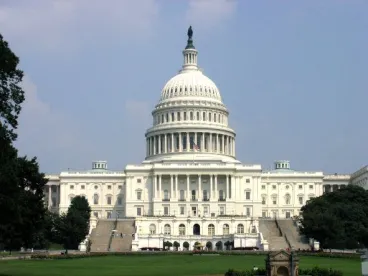As the final votes of the 2022 Midterm Elections are counted, Republicans have taken back control of the House of Representatives, while the Democrats will retain control of the Senate. Both chambers will be held by extremely thin margins, which will boost the status of centrists in each party. The change in House Majority gives Republicans control of key committees and allows for their legislative agenda to be negotiated on a larger stage, notably including plans from several committees to pursue oversight of the Biden Administration’s agenda and handling of the COVID-19 pandemic. The Biden Administration is sure to respond to this by enacting more regulatory change and a continued implementation of legislation enacted during the 117th Congress. Both parties will look for common ground to enact their agenda on high-profile concerns. These bipartisan priorities include health care reform, insulin affordability, cybersecurity, trade agreement reform, and clean energy initiatives. Read more below for what is anticipated to be taken up during the 118th Congress and what the Biden Administration has planned for 2023.
Health Care Priorities
House Republicans have been working on creating a blueprint for their plans through several key reports released by the Health Future Task Force, chaired by Reps. Brett Guthrie (R-KY) and Vern Buchanan (R-FL). This task force was created by Republican Leader Kevin McCarthy (R-CA) in 2021 and is comprised of the Modernization, Treatment, Security, Doctor-Patient Relationship, and Affordably Subcommittees. The overall goals of the 17-member task force are to modernize the health care system to help lower costs, develop better therapies and cures, and provide Americans with more choices. Among other things, priority items for this group on behalf of House Republicans include an extension of telehealth payment coverage; prevention of cyberattacks against healthcare providers; expansion of Medicare device coverage; tech oversight and innovation; oversight of health agencies, and drug affordability for seniors. They are interested in holding hearings to question the Department of Health and Human Services (HHS) Secretary Xavier Becerra and Centers for Medicare and Medicaid Services (CMS) Administrator Chiquita Brooks La-Sure about drug price negotiation and other topics. Additionally, it is certain that investigations into the handling of the COVID-19 pandemic will be a key part of the House Republican’s investigatory agenda.
If not passed in the lame-duck session, the PREVENT Pandemics Act, authored by Chairwoman Patty Murray (D-WA) and Ranking Member Richard Burr (R-NC) will be on the top of the agenda for the Senate health care priorities. You can read more about the PREVENT Pandemics Act from Foley here. The same goes for mental health legislation originally authored and packaged by Senate Finance. Additionally, the Pandemic and All-Hazards Preparedness Act (PAHPA) will be up for reauthorization next year.
Should they not end up in the year-end spending package, potential sources of bipartisan cooperation for next year include Cures 2.0, mental health legislation, insulin affordability legislation, pharmacy benefit manager (PMB) reform, and telemedicine. The White House and HHS have also showed support for permanent extension of pandemic telehealth waivers, though it is unclear when the Public Health Emergency will end (likely to be renewed at least one more time).
Regulatory Priorities
The Biden Administration will continue to implement the Inflation Reduction Act, including its tax credits and drug pricing implementation. The law represents a key portion of the Biden Administration's climate change agenda. Out of the $370 billion allocated to combat climate change, $269 will be enacted via the tax code. Currently, the Treasury Department is finalizing rules across various tax credits, including that of manufacturing clean energy. Treasury and the White House have indicated that they will be finalizing these credits prior to January 1st, 2023, when they will go into effect.
A key provision of the IRA was allowing Medicare to negotiate the costs of specific prescription drugs. Under the law, CMS is required to publish a list of the highest ranked Medicare Part D drugs selected for negotiation by September 1st, 2023. The Secretary of Health and Human Services will have the ability to select a list of 50 Medicare Part D pharmacy drugs and 50 Part B drugs administered via a physician's office. CMS is currently in the process of staffing up to take on this task. The agency has stated that it plans to hire nearly 100 new experts to implement this provision of the law. To learn more about the health care provisions of the IRA, you can read Foley’s summary here.
The Department of Energy will continue to enact portions of the Infrastructure Investment and Jobs Act, most notably its provisions related to hydrogen hubs. The program allocates $8 billion towards establishing six to 10 regional clean hydrogen hubs across the country, in the effort to ramp up production of clean hydrogen and reach goals of net-zero greenhouse gas emissions in the power sector by 2035. Full applications for the program are due by April 2023, selection of hub sites by the DOE are anticipated in Fall 2023.
The National Institute of Standards and Technology (NIST), housed within the Department of Commerce, has begun requesting comments from key stakeholders on its implementation of the CHIPS Act of 2022. The key provisions revolve around incentives to ramp up domestic production of semiconductors. The legislation’s provisions on research & development, in addition to workforce development, have been the main focal points in Commerce’s implementation of the law. Semiconductor production has been a focus of the Biden Administration as it continues to work to ramp up domestic production and reduce foreign dependence in the emerging technologies sector. The Biden Administration has looked to increase domestic competitiveness with foreign economic adversaries, including China, through export controls and the implementation of its EV tax credit limitations. The Administration will likely continue this trend through 2023.
The Departments of Health and Human Services, Labor, and the Treasury will also continue to implement drug pricing provisions from the No Surprises Act.
Tax and Trade Priorities
A key piece of the Republican agenda during their control of the 115th Congress from 2017-2019 was the Tax Cuts and Jobs Act (TCJA). Since Democrats takeover the House in the 2018 Midterm elections and subsequent wins of the Senate and White House in 2020, they have sought to change the tax code set forth by the Trump Administration. In the waning days of the Democrat trifecta of the House, Senate, and White House, there have been reports that they may negotiate with Republicans to codify portions of the TCJA for extensions of their agenda. Notably, Democrats could offer to codify a reform to the Research & Development tax credit in exchange for an extension of the Child Tax Credit. These tax extenders would be taken up in the lame duck session during which Congress will debate appropriations for FY-2023.
Additional tax priorities for Republicans include extending various pieces of the TCJA including that of doubling the standard deduction, reducing the top tax rates, and codifying pass-through deductions. A divided government offers Republicans chances to push their tax agenda in exchange for concessions from the Biden Administration and Congressional Democrats. Democrats took a similar approach during the Trump Administration to push through legislation on expanding paid leave for federal workers.
On the trade front, there is bipartisan support building between the Biden Administration and Congressional Republicans on revamping trade policy towards more free-trade agreements. Outgoing Ways & Means Ranking Member Kevin Brady (R-TX) recently told Politico that he hopes to see the Biden Administration push towards more free trade agreements that model the bipartisan U.S.-Mexico-Canada Agreement (UMCA) enacted under the Trump Administration. Both parties pointed towards foreign economic adversaries in their campaigns and could push for more liberal trade agreements. This comes as the U.S. continues to negotiate with the European Union, in addition to South Korea, regarding restrictions to electric vehicle tax incentives passed under the Inflation Reduction Act in August.
Republicans have indicated support for the U.S. to reenter the Trans-Pacific Partnership. President Biden has already proposed the Indo-Pacific Economic Framework (IPEF), which has included provisions to increase clean energy production and upgrade infrastructure, however it does not include a uniform lowering of tariffs. The 14 member states of the IPEF are currently in the process of negotiating the agreement. Republicans have criticized the IPEF as being a strong opportunity to open markets for American-made products, but that it doesn’t go far enough in its provisions regarding digital and agricultural trade.
Energy Priorities
Inflation and rising energy costs proved to be a decisive issue in the 2022 Midterm Elections. The Biden Administration laid out a robust climate change agenda in 117th Congress and achieved much of it with the passage of the Infrastructure Investment and Jobs Act, in addition to the Inflation Reduction Act. House Republicans outlined in September their conference’s plans to maximize production of American energy and reduce permitting time, in the effort to reduce foreign energy dependence.
The first step could be permitting reform. In late September, Sen. Joe Manchin (D-WV), introduced a bill outlining energy permitting reform, the impetus of which was a deal between Manchin, Senate Majority Leader Chuck Schumer (D-NY), and House Speaker Nancy Pelosi (D-CA) for Manchin’s vote on the Inflation Reduction Act. Manchin hoped that the bill would be included in the September Continuing Resolution, however he acquiesced after failing to secure enough votes for its inclusion. House Republicans, including Select Committee on Climate Change Ranking Member Garret Graves (R-LA) who introduced his own permitting reform package in 2021, have expressed interest in working on the issue. Republicans have also expressed interest in boosting exports of U.S. liquefied natural gas (LNG) as a means of combatting climate change.
Republicans have also expressed interest in increased oversight of the Biden Administration's implementation of the IRA, specifically the $370 billion in clean energy provisions. Of the $370 billion allocated to combat climate change, $269 billion will be implemented via tax credits. There has not been much appetite to attempt to repeal the tax credits outlined within the law. Rather, Republicans may look towards more bipartisan solutions, such as increasing critical mineral production within the United States.
118th Congress Committee and Party Leadership
As party elections get underway, both parties will select their committee chairs and ranking members, in addition to party leadership. Each Chamber conducts elections a bit differently.
Senate Leadership and Committees: The Majority and Minority Leader of each respective party are selected by a majority of their party via a secret ballot. Senate Republicans have already conducted their elections; Sen. Mitch McConnell will retain his position as Minority Leader. Senate Democrats will conduct their elections on December 8th. Each party’s leadership determines committee assignments and their leader on each committee. In the Senate, seniority generally determines chairs and ranking members. Each party’s leadership and members also have a say in committee leadership.
House Leadership and Committees: Majority and Minority Leader of each respective party are selected by a majority of their party via a secret ballot. The only exception to this is the election for Speaker of the House, which requires a majority within the full chamber. Republicans have already voted on their leader, Rep. Kevin McCarthy. When the 118th Congress convenes on January 3rd, 2023, McCarthy will be officially voted on for the position of Speaker of the House. House Democrats will hold their elections on November 30th. House rules provide that each caucus may select member committee assignments, as well as party leadership on each committee.
The following is a list of anticipated candidates for each committee. The only confirmed positions are Senate Minority Leader Mitch McConnell and House Republican Leader Kevin McCarthy, McCarthy will now run for Speaker of the House.
Senate
|
Committee |
Leading Democrat(s) |
Leading Republican(s) |
|
Leadership |
Chuck Schumer (D-NY) |
Mitch McConnell (R-KY) |
|
Aging |
Bob Casey (D-PA) |
Tim Scott (R-SC) |
|
Agriculture |
Debbie Stabenow (D-MI) |
John Boozman (R-AR) |
|
Appropriations |
Patty Murray (D-WA) |
Susan Collins (R-ME) |
|
Armed Services |
Jack Reed (D-RI) |
Jim Risch (R-ID) |
|
Banking |
Sherrod Brown (D-OH) |
Tim Scott (R-SC), Mike Rounds (R-SD) |
|
Budget |
Sheldon Whitehouse (D-RI) |
Chuck Grassley (R-IA) |
|
Commerce |
Maria Cantwell (D-WA) |
Roger Wicker (R-MS), Ted Cruz (R-TX) |
|
Energy |
Joe Manchin (D-WV) |
John Barrasso (R-WY) |
|
EPW |
Tom Carper (D-DE) |
Shelley Moore Capito (R-WV) |
|
Finance |
Ron Wyden (D-OR) |
Mike Crapo (R-ID) |
|
Foreign Relations |
Bob Menendez (D-NJ) |
Jim Risch (R-ID) |
|
HELP |
Bernie Sanders (I-VT) |
Bill Cassidy (R-LA) |
|
HSGAC |
Gary Peters (D-MI) |
Rand Paul (R-KY), Jim Lankford (R-OK) |
|
Indian Affairs |
Brian Schatz (D-HI) |
Lisa Murkowski (R-AK) Election Pending |
|
Intelligence |
Mark Warner (D-VA) |
Marco Rubio (R-FL) |
|
Judiciary |
Dick Durbin (D-IL) |
Lindsey Graham (R-SC) |
|
Rules |
Amy Klobuchar (D-MN) |
Deb Fischer (R-NE) |
|
Small Business |
Ben Cardin (D-MD) |
Joni Ernst (R-IA) |
|
Veterans Affairs |
Jon Tester (D-MT) |
Jerry Moran (R-KS) |
House of Representatives
|
Committee |
Leading Republican(s) |
Leading Democrat(s) |
|
Leadership |
Kevin McCarthy (R-CA) |
Hakeem Jeffries (D-NY) |
|
Administration |
Barry Loudermilk (R-GA), Bryan Steil (R-WI) |
Zoe Lofgren (D-CA), Jamie Raskin (D-MD) |
|
Agriculture |
Glenn Thompson (R-PA) |
David Scott (D-GA) |
|
Appropriations |
Kay Granger (R-TX) |
Rosa DeLauro (D-CT) |
|
Armed Services |
Mike Rodgers (R-AL) |
Adam Smith (D-WA) |
|
Budget |
Jason Smith (R-MO), Jodey Arrington (R-TX), Buddy Carter (R-GA), Lloyd Smucker (R-PA) |
Brendan Boyle (D-PA) |
|
Ed & Labor |
Virginia Foxx (R-NC), Tim Walberg (R-MI), Jim Banks (R-IN) |
Bobby Scott (D-VA) |
|
Energy & Commerce |
Cathy McMorris Rodgers (R-WA) |
Frank Pallone (D-NJ) |
|
Ethics |
Michael Guest (R-MS) |
Susan Wild (D-PA) |
|
Financial Services |
Patrick McHenry (R-NC) |
Maxine Waters (D-CA) |
|
Foreign Relations |
Michael McCaul (R-TX) |
Gregory Meeks (D-NY) |
|
Homeland Security |
Dan Crenshaw (R-TX), Clay Higgins (R-LA), Mark Green (R-TN) |
Bennie Thompson (D-MS) |
|
Judiciary |
Jim Jordan (R-OH) |
Jerry Nadler (D-NY) |
|
Natural Resources |
Bruce Westerman (R-AR) |
Raul Grijalva (D-AZ) |
|
Oversight |
James Comer (R-KY) |
Gerry Connolly (D-VA), Jaime Raskin (D-MD), Stephen Lynch (D-MA) |
|
Rules |
Tom Cole (R-OK) |
Jim McGovern (D-MA) |
|
Small Business |
Roger Williams (R-TX |
Nydia Velazquez (D-NY) |
|
Science |
Frank Lucas (R-OK) |
Zoe Lofgren (D-CA), Suzanne Bonamici (D-OR) |
|
Transportation |
Sam Graves (R-MO) |
Rick Larsen (D-WA), Eleanor Holmes Norton (D-DC) |
|
Veterans Affairs |
Mike Bost (R-IL) |
Mark Takano (D-CA) |
|
Ways & Means |
Vern Buchanan (R-FL), Jason Smith (R-MO), Adrian Smith (R-NE) |
Richie Neal (D-MA) |
The Foley team has published a full recap of the 2022 Midterm Elections. To get a full recap of the House, Senate, and Gubernatorial races, in addition to what is on tap for the lame-duck session, click here.
John R. West also contributed to this article.








 />i
/>i
